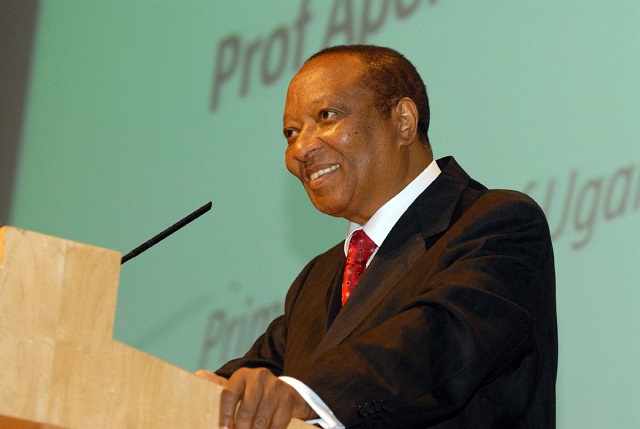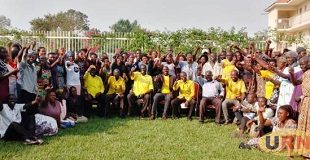
Kampala, Uganda | THE INDEPENDENT | The body of the former Prime Minister, Professor Apollo Robin Nsibambi lay in state in parliament on Thursday afternoon for members of parliament and the public to pay their last respect.
The late Nsibambi, 78, succumbed to leukaemia at his home in Bulange, Mengo on Tuesday evening. Given his position as Prime Minister, Prof. Nsibambi was an ex-officio in parliament and Leader of Government business from 1999 to 2011.
As a result, he was required to make responses to different issues raised by members of Parliament in regard to government policies and programs. Our reporter went through the Hansard, the official record of parliament to look at Nsibambi’s contribution in the house.
A study of the Hansard shows that Prof, Nsibambi desisted from contributing to parliamentary debates without thorough research on the matters before the house.
A trace of the issues raised by Prof. Nsibambi on the floor of parliament during his tenure as Leader of Government Business paints a picture of a researcher, consensus builder, educationist and jovial man.
Time Keeping: Prof. Nsibambi spoke passionately about timekeeping on April 07th, 1999 as part of his first submission on the floor of parliament. He said one of the reasons why people don’t implement things efficaciously is that they don’t take into account the time frame required to carry out routine work and vital government programs.
Researched Submissions: In another parliamentary sitting on June 24 1999, Nsibambi declined to be ambushed with questions that could be easily answered by sector ministers.
“In general, it is imprudent for a Prime Minister to allow himself to be ambushed on questions where there are sector Ministries because you do not get researched answers and therefore it requires a lot of interfacing. You can get dragged into secondary wars and cease being a neutral court of appeal from sector Ministries,” Nsibambi said in his response to Emmanuel Pinto, the former Kakuuto MP.
Pinto had accused the late Nsibambi of maintaining silence and failing to give information concerning government’s readiness to implement the Land Act in the absence of the sector minister to whom the question had earlier on been directed. Nsibambi’s desire to give well-researched responses is further captured in his submission on March 29th 2011 while responding to the demands by Elijah Okupa, the Kasilo County for updates the Northern Uganda Social Action Fund- NUSAF II.
“Mr Speaker and Hon. Members, if Hon. Okupa wanted an answer to that question, he would have done what he normally does; to give me notice in order for me to cause the relevant minister to give him a well-researched answer. Since he has not done so, I am unable to do that. I will cause the relevant minister to give him a well-researched answer. I thank you,” said Nsibambi.
Constructive Criticism and Passion for Education: On July 22nd, 1999, during debate on President Yoweri Museveni’s State of the Nation Address, Prof. Nsibambi asked legislators to accept constructive criticism in order to solve so many outstanding and intricate problems ahead of them.
On June 18th, 1999, despite appreciating the then MP for Otuke County, Omara Atubo for seeking leave of parliament to introduce a Private Member’s Bill entitled “The Constitution Amendment Bill, 1999”, Nsibambi outrightly opposed the motion followed by an entire House.
“The basic problem we are addressing is, ‘who shall get what, when, how and for how long’? In other words, we are saying, ‘what systems shall we use to allocate these scarce resources’? So, this is a pre-eminent political question and I am happy, as a permanent student of political science, to address it,” said the late Nsibambi in part.
He cautioned parliament to address its self to questions set by Atubo especially on the approach that the referendum was costly.
“First, when you use a referendum, you focus on one question. In this particular case, we shall be focusing on one question, and therefore, unlike his approach of elections, we shall not be dealing with many variables like leadership.
For example, yesterday people were also mentioning hospitals; they are mentioning so many other issues. And we are saying when you approach such vital issues and you overload the question, the problem of making people lose focus is maximized. We are saying, we want to minimize the problems, especially when we are dealing with people who have not had basic education for a long time,” Nsibambi added.
His passion for education was evident in his emphasis for the State and parents to provide basic education to children in line with Article 34, Clause 2 of the Constitution, saying there is need to facilitate basic education so as to resolve many more intricate problems without facing distortion.
He told legislators on May 07, 2008 that it was clear that they were very interested in the issue concerning the education of children and appealed to them to avail themselves during holidays to discuss with their children what they study. He also noted that he was getting numerous requests from different people about education and jobs due to difficulties faced by students to finance their higher education. He said that the government was going to address all these issues assiduously noting the introduction of a scheme where people would borrow money.
State of Health: Prof. Nsibambi also spoke out on the State of Health in the country in his submission on August 16th 2010. “Today I visited the Cancer Institute and I grasped the problem; absence of cancer drugs for three months and I learnt that people have died. The National Medical Stores-NMS must provide drugs as people are dying,” he said.
More Submissions from Prof. Nsibambi: On December 11th 2007, Prof. Nsibambi spoke out on concerns about mismanagement of CHOGM funds.
“Mr Speaker, as you are all aware, Uganda hosted CHOGM from 23 to 25 November 2007. Since then, speculations and concerns on the use of CHOGM funds have been rife in this House, in the press and the public at large. Cabinet has found it essential to request the Auditor-General to conduct a value-for-money audit on CHOGM funds,” Nsibambi said then.
He amidst applause expressed concern and support for political and financial accountability noting that government had nothing to hide. On August 29th 2007, Nsibambi is quoted in the Hansard, saying that allocation of scarce resources equitably has always been an issue but noted that the method of doing it also matters.
On June 18th 2009, the late Nsibambi apportioned blame on the government for not taking charge of Article 93 of the Constitution, which requires that any motion or resolution that makes a burden or a charge on the Consolidated Fund or any fund can only be made by Government. He said that parliament shouldn’t be blamed for this.
Responding to queries and demands for the government to declare a state of disaster due to an Ebola outbreak on December 6th 2007, Prof. Nsibambi, said that under the Constitution, they could not declare a state of disaster and that it was under Article 110 where Cabinet could declare a state of emergency when it is essential.
“Tomorrow I am chairing Cabinet and we shall consider all these issues. The Ministry of Health will be there, in particular, Dr Otaala will be there because his colleagues have gone abroad; and obviously, we shall continue to take appropriate action. I want to inform you that this is a virus. It is a very complicated virus, it is a strain which can be handled but it is a difficult one,” Nsibambi said.
A requiem Service is to be held for Nsibambi on Tuesday, June 4, 2019, at St. Paul’s Cathedral Namirembe and will be laid to rest in Buloba in Wakiso district the said day.
*****
URN
 The Independent Uganda: You get the Truth we Pay the Price
The Independent Uganda: You get the Truth we Pay the Price


